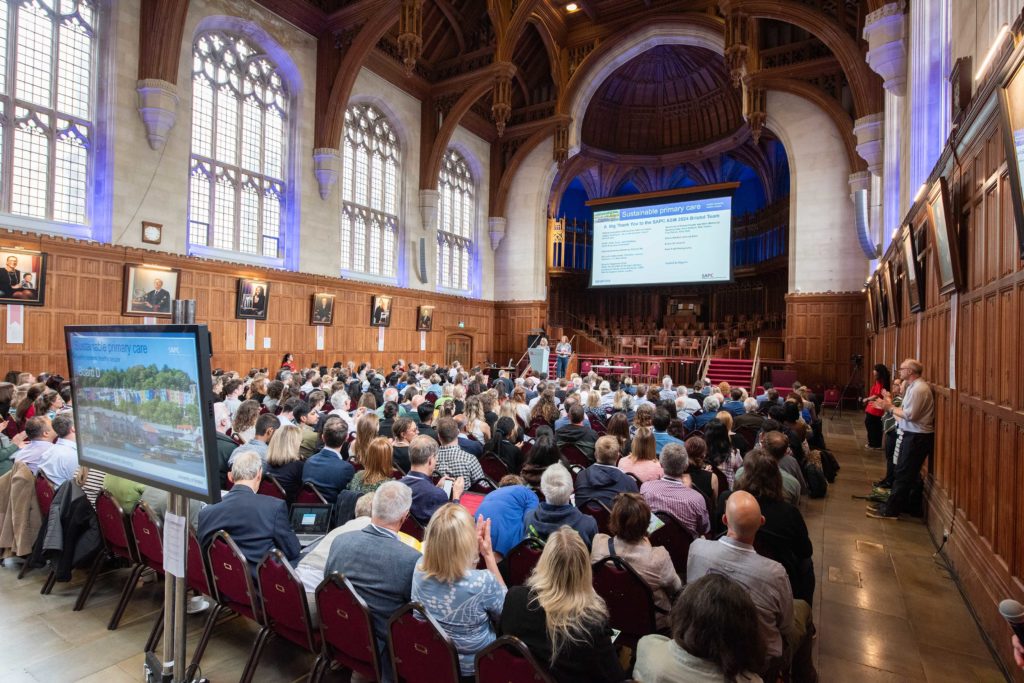Exeter Collaboration for Academic Primary Care (APEx) Blog
Exeter Collaboration for Academic Primary Care (APEx) Blog
Posted by ma403
3 September 2024In July I attended the Society for Academic Primary Care (SAPC) conference in Bristol, my adopted home. This year the theme was “Sustainable Primary Care: healthy systems, healthy people”, which seemed fitting as Bristol is the UK’s first cycling city and has been voted the most environmentally friendly city in the UK. It also cannot be ignored that the conference was held with the backdrop of the General election and the sense of nervous but hopeful anticipation that filled the air. A healthcare conference held under these circumstances, bought home more than ever, the importance of the outcome, not just for the NHS and healthcare but the nation’s health and wellbeing more broadly.
The conference brought together professionals from various disciplines, all united by a common goal: to explore and promote sustainable practices that could shape the future of primary care. As an early career researcher, who is navigating the intricacies of academic primary care and its real-world application, this conference provided a unique opportunity to immerse myself in a programme that offered hundreds of presentations, workshops and seminars showcasing the latest in primary care research in the UK. This included some of brilliant and varied work being conducted in Primary Care at Exeter, with presentations from Rupert Payne, Jo Butterworth, Jane Smith, Deepthi Lavu, Stella Kozmer and Judit Konya just to name a few.
One of the highlights of the conference was The Helen Lester Memorial Lecture, delivered by Dr Caroline Mitchell’s. It was a compelling call to action, a call to transform primary care research by actively challenging traditional hierarchies and embracing empowering, community-driven methodologies. Her insightful talk inspires a necessary shift towards research equity, which I think resonated strongly with many of us who are committed to inclusive, impactful research practices.
The conference also provided an opportunity for engaging discussions about practical solutions to the challenges facing primary care. During workshops and panel discussions, we were able to explore innovative approaches being implemented nationally and globally, such as the integration of telemedicine to reduce carbon footprints, the promotion of preventative care to minimize resource-intensive treatments, and the use of eco-friendly medical supplies. These sessions were particularly valuable as they offered concrete examples of how sustainability can be woven into the fabric of primary care practice. As an early career researcher, these insights were invaluable, providing me with a clearer understanding of how research can drive practical, sustainable change in healthcare. The conference also provided a great setting to connect with experienced researchers, healthcare professionals, and policymakers who are leading the charge in sustainable healthcare. These interactions were not only inspiring but also instrumental in expanding my professional network. I engaged in thought-provoking conversations that challenged my perspectives and provided me with new ideas for collaborative projects.
Another highlight was the conference dinner, where we were lucky enough to enjoy a drinks reception and dinner in the beautiful Bristol Museum and Art Gallery. Our conversations and connections continued but took on a more light-hearted tone with live music, dancing and some very suspect air guitar battles.
On the second day, the “Dangerous ideas soapbox”, where presenters proposed a variety of controversial or ‘dangerous ideas’ was a brilliant addition to the conference programme and something I think should be included in future conferences. It was incredibly fun, challenging and provoked a good deal of discussion both during the session and afterwards. As the conference drew to a close, I walked out of the Wills Memorial Building, with a renewed sense of purpose and a deeper understanding of the importance of sustainability in healthcare. The conference emphasized the idea that sustainability is more than an environmental issue but a central factor in delivering effective and equitable healthcare. For me, attending this conference was more than just an educational experience—it was a call to action. As I continue my journey as an early career researcher, I am excited to contribute to the growing movement towards a more sustainable, equitable and resilient healthcare system.
